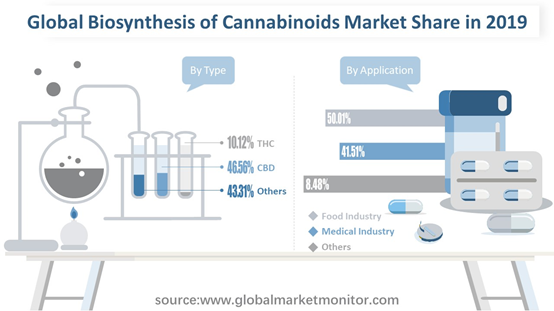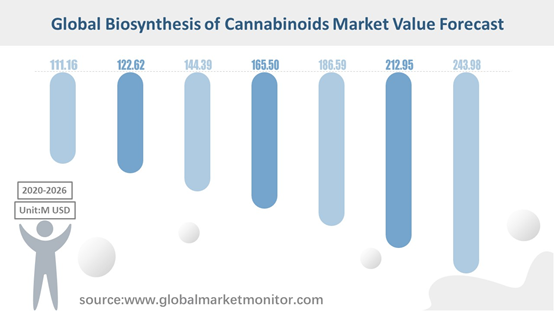Cannabinoids,
also known as arachidonic acid ethanolamine, exist in the cannabis plant, but
also in the nervous and immune systems of animals. They act as
neurotransmitters and have a variety of pharmacological effects on the nervous
system. Biosynthesis of cannabinoids is one of the nine categories of new
psychoactive substances. It is a synthetic chemical substance, independent of
the cultivation of cannabis, with lower cost and easy access. Its main forms are
commonly known as twigs, e-cigarette oil and Natasha.
Tetrahydrocannabinol
(THC) and cannabidiol (CBD) are two of the most important cannabinoids. THC has
anesthetic, anti-cancer, anti-vomiting, diuretic and other effects, which is
recognized as a strong stimulant to the nervous system. CBD is not addictive
and is a beneficial component of cannabis of great medical value, having
therapeutic value in the treatment of psychosis and epilepsy, as well as many
other potential medical and healthcare applications. The market share of these
two cannabinoids is not much different, with THC and CBD having 43.31% and
46.56% market share in 2019, respectively.

Cannabis has been grown and used worldwide for thousands of years. Studies have found that some cannabinoids have significant medicinal and commercial value, generally used in the food industry and the medical industry. CBD is a substance commonly added to food, which can regulate our body and maintain internal balance. In fact, doctors have known about the therapeutic properties of cannabis since the middle ages, and modern medicine has shown that cannabinoids are useful in treating multiple sclerosis and certain types of pain. In 2019, the market share of cannabinoids in the food and medical industries was 50.01% and 41.51%, respectively. It is expected that the market share of cannabinoids in the medical industry will be broader in the future, and the market share of the food and medical industries will be 46.06% and 44.76% by 2026.
Nevertheless, the harm of biosynthesis of cannabinoids is also outstanding, mainly manifested in large number, many cases, serious harm, many varieties and rapid update. It can produce strong excitement, hallucination and other effects, and has become a new psychoactive substances covering the most types of substances, the most serious abuse of a substance.
Prospect Analysis of Biosynthesis of Cannabinoid Industry in Various Regions
Currently, there are about 40 biosynthesis of cannabinoid companies worldwide, with a market value of $111.16 million. Companies in the industry are mainly from North America with high industry concentration. The top three companies are Gingko Bioworks, Teewinot Life Sciences and Hyasynth Bio, with market share of 25.73%, 10.05% and 9.24% respectively in 2019.
Get the Complete Sample, Please Click: https://www.globalmarketmonitor.com/reports/763051-biosynthesis-of-cannabinoids-market-report.html
North America was the largest revenue market with a market share of 79.79% in 2015 and 76.04% in 2020 with a decrease of 3.75%. The popularity of cannabis products in North America is mainly driven by policy. With the legalization of cannabis in Canada and some states in the United States, International Cannabis Day is gradually entering the mainstream. Europe ranked the second market with the market share of 13.68% in 2019. Other places have a small proportion, however, in recent years, with the rapid economic development, the improvement of human living standards and the change of their ideas, the application of cannabinoids has become more common.
Cannabis is illegal in many countries and regions, while medical cannabis or recreational cannabis is legal in some regions. Since 2017, the governments of the United Kingdom, Germany, the United States and other countries have approved the use of medical cannabinoids. suffering from multiple sclerosis people with serious diseases, such as ailments, can legally obtain drugs with prescriptions. In addition, Canada legalized recreational cannabis in 2018, which directly led to a surge in the cannabinoid market. Although the legality of cannabis continues to advance, it is still restricted by law in the short term, and biosynthesis of cannabis is also restricted. Therefore, due to national policies, the uncertainty in the biosynthesis of cannabinoid market has increased, and companies in the industry need to bear certain risks.
The Market for Biosynthesis of Cannabinoids is Expected to Expand
Medical security has always been a very important field for people. The medical value applications of cannabinoids are becoming more and more extensive, which has promoted its market growth. According to our research, the global biosynthesis of cannabinoids market has a total production value of 17.79 M USD back in 2015, and increased to 111.16 M USD in 2020. We made the prediction that the value of global biosynthesis of cannabinoids market markets can be 243.98 M USD by 2026. The CAGR of global biosynthesis of cannabinoids market is 14.00% from 2020 to 2026.

Biotechnology
has helped the production of cannabinoids, enabling people to obtain rarer and
more powerful cannabinoid products. At the same time, the production of
cannabinoids by fermentation synthetic biology can achieve low cost and high
purity, which is conducive to the expansion of cannabinoid production.
Although
humans have relied on cannabinoids for health and medicinal purposes for
centuries, the biosynthesis of cannabinoids requires the use of genetically
modified technology, which has caused some people to worry about the safety of
these products. Technological innovation plays an important role in promoting
market growth. In order to survive in a highly competitive market, suppliers
should develop new ideas and technologies, keep pace with advanced
technologies, solve people concerns, and gain competitive advantage and greater
market share.
We provide more professional and intelligent market reports to complement your business decisions.